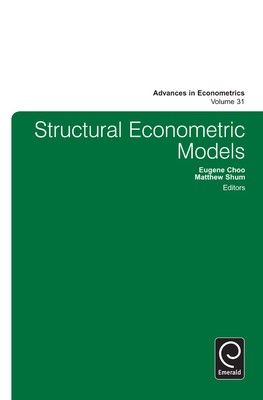
- We will send in 10–14 business days.
- Publisher: Emerald Group Publishing
- ISBN-10: 1783500522
- ISBN-13: 9781783500529
- Format: 15.5 x 23.1 x 3.6 cm, hardcover
- Language: English
- SAVE -10% with code: EXTRA
Structural Econometric Models (e-book) (used book) | bookbook.eu
Reviews
Description
This volume of Advances in Econometrics focuses on recent developments in the use of structural econometric models in empirical economics. The papers in this volume are divided in to three broad groups. The first part looks at recent developments in the estimation of dynamic discrete choice models. This includes using new estimation methods for these models based on Euler equations, estimation using sieve approximation of high dimensional state space, the identification of Markov dynamic games with persistent unobserved state variables and developing test of monotone comparative static in models of multiple equilibria. The second part looks at recent advances in the area empirical matching models. The papers in this section look at developing estimators for matching models based on stability conditions, estimating matching surplus functions using generalized entropy functions, solving for the fixed point in the Choo-Siow matching model using a contraction mapping formulation. While the issue of incomplete, or partial identification of model parameters is touched upon in some of the foregoing chapters, two chapters focus on this issue, in the context of testing for monotone comparative statics in models with multiple equilibria, and estimation of supermodular games under the restrictions that players' strategies be rationalizable. The last group of three papers looks at empirical applications using structural econometric models. Two applications applies matching models to solve endogenous matching to the loan spread equation and to endogenize marriage in the collective model of intrahousehold allocation. Another applications looks at market power of condominium developers in the Japanese housing market in the 1990s.
EXTRA 10 % discount with code: EXTRA
The promotion ends in 17d.18:26:35
The discount code is valid when purchasing from 10 €. Discounts do not stack.
- Publisher: Emerald Group Publishing
- ISBN-10: 1783500522
- ISBN-13: 9781783500529
- Format: 15.5 x 23.1 x 3.6 cm, hardcover
- Language: English English
This volume of Advances in Econometrics focuses on recent developments in the use of structural econometric models in empirical economics. The papers in this volume are divided in to three broad groups. The first part looks at recent developments in the estimation of dynamic discrete choice models. This includes using new estimation methods for these models based on Euler equations, estimation using sieve approximation of high dimensional state space, the identification of Markov dynamic games with persistent unobserved state variables and developing test of monotone comparative static in models of multiple equilibria. The second part looks at recent advances in the area empirical matching models. The papers in this section look at developing estimators for matching models based on stability conditions, estimating matching surplus functions using generalized entropy functions, solving for the fixed point in the Choo-Siow matching model using a contraction mapping formulation. While the issue of incomplete, or partial identification of model parameters is touched upon in some of the foregoing chapters, two chapters focus on this issue, in the context of testing for monotone comparative statics in models with multiple equilibria, and estimation of supermodular games under the restrictions that players' strategies be rationalizable. The last group of three papers looks at empirical applications using structural econometric models. Two applications applies matching models to solve endogenous matching to the loan spread equation and to endogenize marriage in the collective model of intrahousehold allocation. Another applications looks at market power of condominium developers in the Japanese housing market in the 1990s.


Reviews